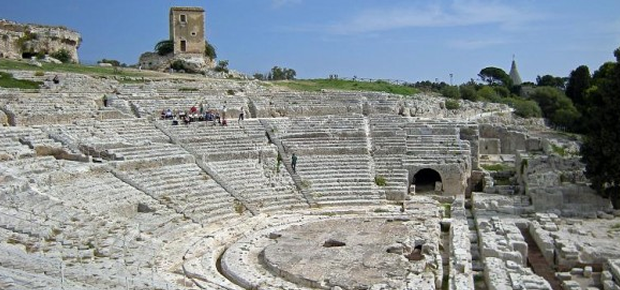
1.8 The Comedy
In 1958 the publication of a papyrus written in the third century AD. made known to us the text of Dyscolos or Misanthrope, a play between the first and the least important of the Athenian poet Menander, born in 342 the 341. Before then, Greek comedies full of our knowledge they were only eleven, other and larger Athenian Aristophanes (born around 450). As the tragedy, even the comedy classic was a monopoly Athenian, and the representations were, in competition, the Dionysian festivals. Some form of comedy probably existed everywhere in the world greek. That perfected by the Athenians, exclusively Athenian, was the poetic comedy complex, with few actors and a choir. In the fifth century, the so-called Old Comedy, the actors wore costumes exaggerated and grotesque, performed countless games rowdy, were rampant, turbulent, obscene, and at times lyrical and became serious. No greek unable to speak for several minutes without making some reference to the gods and myths. And so did also the comedy, but rarely, despite the background of the party, it had a religious theme, even if it were in a minor key.
The comic poets looked primarily to the contemporary scene in all its rich variety, with his political life, with its own customs and habits, sue the e mania mode, aspirations, i vizi, new ideas and traditions outdated, the generals and the soldiers, farmers, i filosofi, the youths and slaves. Free from the shackles of the canonical tragedy, the comic writers employed every trick imaginable style to pour torrents of ridicule and insults on people and ideas, and often, even the gods escaped to their aggressiveness. Sometimes or targets were disguised, but not enough, to mislead a viewer just informed, but they were often called by their real names, like Socrates in the Clouds, or Euripides in the Acharnians, in frogs and Thesmophoriazusae.
We can only judge the ancient comedy by Aristophanes. He had a spirit and a diatribe ready, like the ferocity of his invective, and possessed a penetrating intelligence. He was also able to reach a poem of great beauty and seriousness. It is always hard to tell when a joke is just a joke or a dig outrageous, or the extent to which serious steps are really serious, and what their intention. Of the top ten plays of Aristophanes, all represented during the first half of the Peloponnesian War, seven had about politics and were full of stocked directed toward the popular leaders, beginning with Pericles, against the people's courts and against the war itself. They were bad jokes, much more than you could tolerate in modern performances magazine. However, can not be said that Aristophanes was against the Athenian democracy and against the war with Sparta; or that his representation of demagogues, the urban populace and the people's courts is balanced and accurate, or purporting to be such. Meanwhile, you can quote passages of the plays remained that can serve as evidence in either a forward or reverse direction; also, during his career, Aristophanes reported four times the first prize, three times the second and once the third. These successes represent a record, the Old Comedy, and suggest that the public, that was not an enemy of democracy and war, did not see a political opponent in the poet said. However, it is not credible that everything was reduced to a healthy enjoyment, no offense given or received. Plato, faceva dire of Socrates, in its self-defense in court in 399 (Apology): "The accusers who truly fear are those who spread false rumors about my work, saying, for example, I have the skill to bring up the topic better worst. I can not cross-examine. I do not even know their names, I can not say who they are, if not one that is perhaps a comic poet. "allusion to Aristophanes is explicit and one can not forget the testimony of Plato on the lasting effectiveness of the Clouds. It must be admitted that in the comedies of Aristophanes is all done with such insight and critical sense that many of the jokes and hilarious scenes are still at a distance of more than 2000 age. Perhaps nothing more than the Old Comedy reflects certain qualities of fifth-century, its broad freedom, his self-confidence, its vitality and exuberance, the ability of the demos to laugh at himself.
The end of the Peloponnesian War also marked the end of this type of comedy. The play of the fourth century was, outset, as in the last works of Aristophanes, quieter tones, less pungent and aggressive, generally less immediate social and political content. The New Comedy, con Menandro, abandonment of all the current business, political ideas currents and high social issues. He became a comedy of manners, respectable, moderate, less obscene, limited to fictional characters and plots monotonous conventional, that is, a comedy of errors.
The comedy of Aristophanes was concentrated around the semi-serious attempts of a free individual, acting on its own initiative, trying to get to the bottom of a large public crisis or a major illness considered, eating Peloponnesian War, as the pernicious teachings of the Sophists, the bad poetry of Euripides and his attitude towards women. At the center of the plots of Menander, are the stratagems, skilled and usually tortuous, invented to rescue a girl from a pimp or to unite two lovers, private business in which they could engage not only the slaves and the free. The New Comedy was a form appropriate for the last days of independence Athenian, when the polis was struggling to survive, and even more so for the Athens politically annihilated the half-century that followed Alexander the Great. It retained its popularity for a long time, superior to that of the Old Comedy, Also among the Romans, among which was widely known and loved in the adaptations and Latin imitations of Plautus and Terence (who lived in the hundred years between the 250 and the 150).




